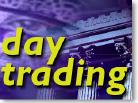|
Day trader decries new rule
|
 |
March 26, 1999: 7:11 p.m. ET
NASD proposal would lead to lawsuits, top day trader exec says
|
NEW YORK (CNNfn) - Day trading companies have resigned themselves to new Nasdaq rules that would require them to deem whether investors who use electronic trading systems are making "appropriate" trades, a leading industry executive said.
A so-called "appropriateness" standard, one of several new rules approved by the board of the National Association of Securities Dealers Thursday, will effectively require day trading firms to abide by the same rules traditional broker-dealers have for years.
Another proposal, which the president of a day-trading industry group said is in line with existing industry standards, would require the firms to fully disclose the risks of day trading.
The actions are part of an effort to ensure investors are well-informed about "high-risk investment activities like day trading," Nasdaq Chairman and Chief Executive Frank Zarb said in a statement Thursday. "It is an important step toward making individuals aware of the potential risks involved in day trading."
The NASD, which operates the Nasdaq exchange, said Thursday it forwarded those proposals to its 5,500 broker-dealer members for comment before they pass before the U.S. Securities and Exchange Commission.
Jim Lee, president of the industry group The Electronic Traders Association, said the rules, which were expected, are based on inaccurate notions of what day trading is.
"I don't think we can support the appropriateness standard in the form we see it today," Lee said "It reflects a general lack of understanding of the day trading business."
Day traders try to cash in on small price swings by purchasing shares of a stock in the morning and then selling them later in the session. Companies that provide access to day trading, like cyber-cafes for the profit-hungry, set up member investors with the equipment they need to trade electronically.
The difference with electronic trading firms, which allow members to trade on their own using technology once exclusive to Wall Street firms, is that investors make their own trades.
Lee, who is also president of the Houston-based day trading firm Momentum Securities Inc., said there's he and his counterparts have little hope that the new rules won't be adopted.
"I would just encourage that [the final proposals] reflect a better understanding of the business; in the current form it's not workable," Lee said.
Lee also said the new directives would open the door to civil liability lawsuits against many day trading firms. Several states have already taken legal action against day trading firms.
"This is a new layer of regulation for an industry [regulators] know little about," he said. "This, unfortunately, has come from the top-down."
According to Lee, some 15 percent of the daily trading volume on the Nasdaq is carried out by day traders. The ETA has twice sought a seat on the petitioned for representation on the NASD's quality of markets committee - only to be rejected each time, Lee said.
|
|
|
|
|
 |

|

